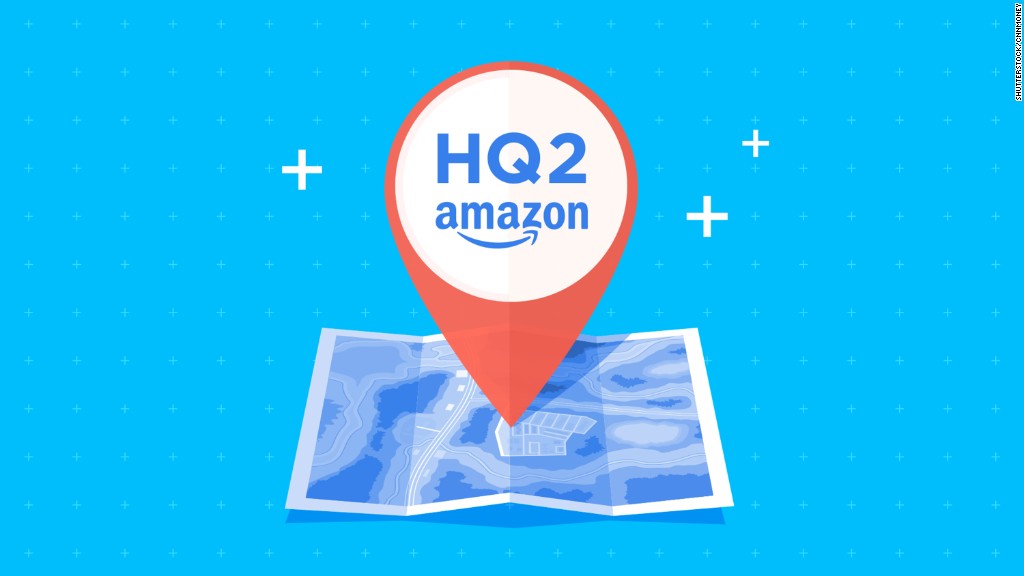
Hundreds of cities are vying to be Amazon's second home.
But a history of controversial legislation could hold some of them back.
Amazon says 238 cities and regions across North America put in bids to become its second headquarters, the company's largest expansion outside Seattle. The winner gets tens of thousands of jobs and a lift for the local economy.
Texas and Georgia are among the competition's heavy hitters. Several cities in each state were part of bids for HQ2, and Austin and Atlanta have been floated as top contenders by analytics firms and gambling sites.
One potential snag: Both states recently tangled with bills that met fierce opposition from major corporations, including Amazon in one case.
State officials in Texas this year considered a "bathroom bill" that would have required people to use school restrooms that match the sex on their birth certificates.
Amazon (AMZN) was among dozens of companies that knocked the bill for discriminating against transgender people. One of the company's top executives, Jeff Wilke, signed onto a letter in May that called such laws "bad for our employees and bad for business."
The company has supported protections for LGBT people. Last year, Amazon joined a coalition of other businesses backing a federal anti-discrimination bill.
And at a dinner last month, the Human Rights Campaign, an LGBT rights organization, gave Amazon CEO Jeff Bezos its National Equality Award.
"Across the United States, more people now support gay and trans rights than ever before," Bezos said. "I believe that the idea of equality is ingrained deeply within all of us. It is inalienable."
Amazon did not respond to a request comment for this story.
The Texas bill was eventually defeated. But some experts say it could have lingering effects.
"Even failed legislation is costly for a state's reputation and image," said Mark Jones, the political science fellow at Rice University's Baker Institute for Public Policy.
"Efforts like the 'bathroom bill' in Texas would make it difficult for Amazon to attract the best and the brightest in the Lone Star State."
That's the fear for Byron Cook, a Republican state representative in Texas who opposed the bill.
In an op-ed for the Austin American-Statesman in September, Cook suggested Amazon wouldn't take the state seriously until the governor shut down any chance that the bill might return.
"We heard universally from industries that they are opposed to discriminatory legislation, particularly when it solves no problems," Cook told CNNMoney. "I don't think this company is going to take a risk with something being polarized."
Cook's concerns aren't unique.
In Georgia, Governor Nathan Deal, a Republican, vetoed a "religious liberty" bill last year that would have given religious organizations in Georgia the option to deny services and jobs to LGBT people.
It was roundly criticized by companies like Disney, Salesforce and Coca-Cola, which considered it discriminatory.
But Deal leaves office after next year. And some of his potential replacements have reportedly said they would support similar legislation. That led a top aide for Deal to warn that any future efforts to pass similar bills could hurt the state's chances with Amazon, according to The Atlanta Journal-Constitution.
The aide, Chris Riley, declined to comment to CNNMoney.
Some of the cities that have bid for the Amazon site, like Austin and Dallas, have their own ordinances that prohibit discrimination because of sexual orientation or gender identity.
But Jones, the public policy fellow, said even those measures might not be enough to assuage concerns.
He pointed to the city's recent spat with Uber and Lyft, the ride-hailing companies. After city residents voted last year to require such companies to fingerprint drivers, the two services pulled out of Austin.
Austin moved on -- at least until state lawmakers overturned the local regulation.
"Austin is an island, but it's an island surrounded by the sea of Texas," Jones said. "Austin can only do so much to buttress or hold back statewide policies."

